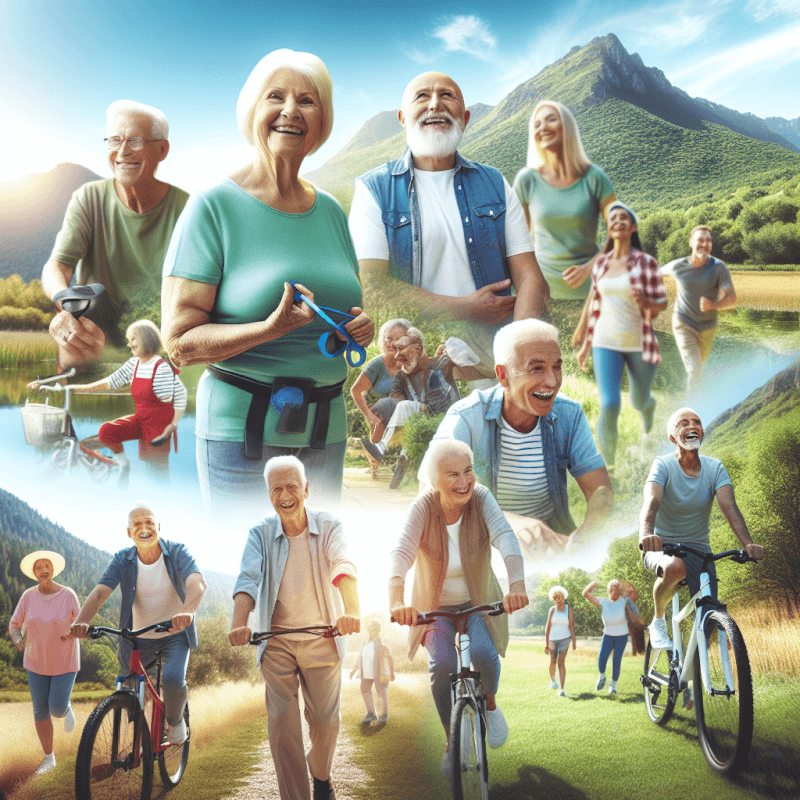Have you ever wondered about the incredible benefits that outdoor activities like hiking and cycling can have for older adults? From improving physical health to boosting mental well-being, engaging in these activities can provide a range of advantages for seniors. Whether it’s the picturesque views and fresh air of hiking or the freedom and cardiovascular exercise of cycling, these outdoor pursuits can enhance overall quality of life and contribute to a healthier and more fulfilling senior experience. So, lace up your hiking boots or hop on your bike, because there’s a world of benefits waiting for you out there!

Physical Health Benefits
Improved cardiovascular health
Engaging in outdoor activities like hiking and cycling can greatly improve your cardiovascular health. These activities provide opportunities for aerobic exercise, which is essential for maintaining a healthy heart and strong lungs. As you engage in these activities, your heart rate increases, promoting better blood flow and oxygen delivery to your muscles. This helps to strengthen your heart over time and reduce the risk of cardiovascular diseases such as heart attacks, strokes, and high blood pressure.
Increased strength and stamina
Outdoor activities like hiking and cycling offer a fantastic way to build strength and improve stamina. These activities require the use of various muscle groups, challenging and toning your muscles as you move uphill, pedal against resistance, or traverse rough terrain. With regular participation, you’ll gradually notice an increase in your overall strength and endurance. This improvement in physical fitness not only enhances your ability to perform daily activities but also reduces the risk of injuries and improves your quality of life.
Maintaining a healthy weight
If you’re looking to maintain a healthy weight or even shed a few extra pounds, outdoor activities like hiking and cycling can be incredibly beneficial. These activities are effective calorie burners, helping you achieve a calorie deficit and promote weight loss. Additionally, outdoor activities provide a more enjoyable and engaging alternative to indoor workouts, making it more likely for you to stick to your fitness routine and reach your weight management goals.
Reduced risk of chronic diseases
Regular participation in outdoor activities contributes to a reduced risk of chronic diseases. By engaging in physical activities like hiking and cycling, you’re actively promoting a healthy lifestyle that can decrease the chances of developing conditions such as diabetes, certain types of cancer, and osteoporosis. These activities help to regulate blood sugar levels, strengthen bones, and support overall immune function. By reducing the risk of chronic diseases, you can enjoy a higher quality of life and increase your lifespan.
Mental Health Benefits
Reduced stress and anxiety
Outdoor activities like hiking and cycling have been shown to significantly reduce stress and anxiety levels. They offer an escape from daily pressures and provide an opportunity to reconnect with nature, which naturally promotes relaxation and well-being. The combination of physical activity, fresh air, and exposure to natural environments can help lower cortisol levels, the hormone associated with stress. Engaging in outdoor activities allows you to unwind, clear your mind, and experience a sense of tranquility.
Improved mood and self-esteem
Spending time outdoors and participating in activities like hiking and cycling can have a positive impact on your mood and self-esteem. Physical exercise releases endorphins, also known as “feel-good” hormones, which enhance your mood and create a sense of happiness. As you challenge yourself and achieve personal goals during outdoor activities, your self-esteem and self-confidence naturally increase. This boost in mood and self-esteem can have a profound effect on your overall mental well-being.
Enhanced cognitive function
Outdoor activities have been found to enhance cognitive function, particularly in older adults. Activities like hiking and cycling require mental engagement as you navigate trails or plan your routes. This type of mental stimulation helps improve memory, attention span, and problem-solving skills. Additionally, being in nature and surrounded by natural beauty can help reduce mental fatigue and improve concentration and focus.
Prevention of cognitive decline
Participating in outdoor activities has been linked to a lower risk of cognitive decline and neurodegenerative diseases such as Alzheimer’s disease. Regular physical activity keeps your brain active and promotes the growth of new neurons, helping to maintain cognitive function and prevent or slow down the progression of age-related mental decline. Outdoor activities provide an enjoyable and effective way to keep your mind sharp and reduce the risk of cognitive decline as you age.
Social Benefits
Opportunities for social interaction
Engaging in outdoor activities like hiking and cycling provides ample opportunities for social interaction. Whether you join a hiking club, cycling group, or simply spend time with friends and family in nature, these activities foster connections and enable you to meet like-minded individuals. Social interaction is crucial for maintaining mental well-being as it reduces feelings of loneliness and isolation. Through outdoor activities, you can build new friendships, strengthen existing relationships, and enjoy the camaraderie of shared experiences.
Sense of belonging and community
Participating in outdoor activities often cultivates a sense of belonging and community. Whether you’re part of a local hiking or cycling community or simply find solace in connecting with nature, these activities create a sense of unity and togetherness. Outdoor enthusiasts often form tight-knit communities, sharing advice, experiences, and environmental awareness. The sense of belonging that comes from being part of a community fosters a positive mental outlook and contributes to overall well-being.
Improved social connections
Engaging in outdoor activities can significantly improve social connections in various aspects of life. Whether it’s through organized group hikes or casual encounters with fellow cyclists on your favorite trail, outdoor activities provide common ground for meaningful interactions. These experiences allow you to connect with others based on shared interests, passions, and goals. By expanding your social connections, you enhance your support network, boost your mental health, and create lasting friendships.
Emotional Benefits
Increased feelings of happiness and well-being
Outdoor activities like hiking and cycling have a profound impact on your emotional well-being. Spending time in nature and engaging in physical activity releases endorphins, the “feel-good” hormones that promote happiness and well-being. The combination of the natural surroundings, fresh air, and exercise creates a positive emotional state, leading to increased feelings of happiness and contentment. The more you prioritize outdoor activities, the more you can tap into these emotional benefits and experience a general sense of fulfillment.
Improved emotional resilience
Engaging in outdoor activities can enhance your emotional resilience, enabling you to better cope with life’s challenges. Outdoor activities often provide a sense of calm and perspective, allowing you to reflect and gain clarity. By facing physical and mental challenges during these activities, you develop resilience and learn to overcome obstacles. This newfound emotional resilience can translate into other areas of your life, helping you navigate difficult situations with greater ease and adaptability.
Better stress management
Outdoor activities are highly effective in managing stress. The combination of physical exertion and exposure to nature helps reduce stress hormones and promotes a relaxed state of mind. Engaging in activities like hiking or cycling allows you to detach from the pressures of daily life and focus on the present moment. It provides an outlet to release stress and gain mental clarity, resulting in improved stress management and a more balanced and harmonious lifestyle.

Boosted Immune System
Strengthened immune system
Outdoor activities like hiking and cycling can contribute to a strong and healthy immune system. Regular exercise has been shown to stimulate the immune system, making it more efficient at fighting off illness and infections. As you engage in moderate-intensity activities, such as hiking or cycling, your body increases the production of antibodies and immune cells. This, in turn, strengthens your immune system and helps protect against various pathogens.
Reduced risk of infections and illnesses
By boosting your immune system through outdoor activities, you decrease your vulnerability to infections and illnesses. Regular physical activity plays a significant role in preventing common illnesses, such as colds and respiratory infections. Additionally, spending time in nature and away from crowded indoor environments reduces your exposure to germs and pathogens, further reducing the risk of infections. By prioritizing outdoor activities, you can help fortify your immune system and maintain good health.
Improved Balance and Coordination
Enhanced balance and coordination skills
Outdoor activities like hiking and cycling can greatly enhance your balance and coordination skills. These activities often require navigating uneven terrain, negotiating obstacles, and maintaining stability while moving. By repeatedly engaging in hiking or cycling, you challenge your body’s balance and coordination systems, improving their function over time. Enhanced balance and coordination skills contribute to better overall mobility and reduce the risk of falls and injuries, particularly as you age.
Reduced risk of falls and injuries
Engaging in outdoor activities and improving your balance and coordination skills significantly reduce the risk of falls and related injuries. As you enhance your body’s ability to adapt to different terrains and maintain stability, you are less likely to experience accidental falls. Falls can have severe consequences, especially for older adults, ranging from minor bruises to fractures and head injuries. By prioritizing outdoor activities that promote balance and coordination, you can mitigate these risks and maintain your physical well-being.

Joint Health and Flexibility
Improved joint health and flexibility
Outdoor activities like hiking and cycling contribute to improved joint health and flexibility. Physical activities that involve lower impact movements, such as hiking on moderate terrain or cycling, allow your joints to move through their full range of motion, improving flexibility and reducing stiffness. These activities also promote the production of synovial fluid, which lubricates the joints and supports their health. Strengthening your muscles through outdoor activities further supports joint stability and reduces the risk of joint-related issues.
Reduced risk of arthritis and joint-related issues
Engaging in outdoor activities can reduce the risk of arthritis and other joint-related issues. Regular exercise, particularly activities that involve weight-bearing or impact, helps maintain bone density and joint integrity. By regularly participating in activities like hiking and cycling, you reduce the risk of developing arthritis, a condition characterized by joint inflammation and pain. Additionally, outdoor activities contribute to maintaining healthy muscles and connective tissues, further supporting joint health and reducing the chances of joint-related issues.
Vitamin D Production
Increased exposure to sunlight and vitamin D
Outdoor activities like hiking and cycling provide ample opportunity for increased exposure to sunlight, leading to enhanced vitamin D production. When your skin is exposed to sunlight, your body synthesizes vitamin D, which is essential for numerous bodily functions, including bone health and immune function. Spending time outdoors and engaging in activities under the sun ensures that you receive an adequate amount of vitamin D, promoting overall well-being and reducing the risk of deficiency-related conditions.
Promotion of bone health and immune function
Vitamin D, produced through exposure to sunlight during outdoor activities, plays a crucial role in promoting bone health and supporting immune function. This essential nutrient assists in the absorption of calcium and phosphorus, contributing to strong and healthy bones. Adequate vitamin D levels also support the immune system, helping to defend against infections and maintain optimal immune function. By prioritizing outdoor activities and ensuring sunlight exposure, you can optimize vitamin D levels and improve both bone health and immune system functionality.

Increased Lifespan
Improved longevity
Engaging in outdoor activities like hiking and cycling has been associated with improved longevity. Regular participation in physical activities promotes overall health, reduces the risk of chronic diseases, enhances cardiovascular health, and strengthens the immune system – all factors that contribute to a longer and healthier life. By integrating outdoor activities into your lifestyle, you invest in your long-term well-being and increase your chances of living a longer and more fulfilling life.
Reduced risk of premature death
Outdoor activities have been shown to reduce the risk of premature death. Engaging in regular exercise, such as hiking and cycling, significantly lowers the risk of developing chronic conditions like heart disease, certain types of cancer, and diabetes – all of which can lead to premature mortality. By prioritizing these outdoor activities, you actively mitigate the risk factors associated with premature death, ensuring a higher likelihood of enjoying a long and vibrant life.
Opportunity for Exploration
Discovering new places and environments
Engaging in outdoor activities like hiking and cycling provides an excellent opportunity for exploration. These activities allow you to discover new places, trails, and natural beauty in your surroundings. Whether you choose to hike through breathtaking landscapes, cycle along scenic routes, or explore hidden trails, the outdoors offers a vast playground waiting to be explored. This opportunity for exploration helps stimulate your sense of curiosity and provides a sense of adventure, rejuvenating your spirit and expanding your horizons.
Appreciating nature and its beauty
Outdoor activities like hiking and cycling allow you to immerse yourself in nature and fully appreciate its beauty. Being surrounded by natural environments, such as lush forests, serene lakeshores, or majestic mountain ranges, fosters a deep connection with the world around you. Observing the wonders of nature and its intricate details can evoke a sense of awe and wonder, providing a respite from the hustle and bustle of everyday life. Engaging in outdoor activities allows you to develop a greater appreciation for the beauty of the natural world and its ability to nurture your well-being.
In conclusion, outdoor activities like hiking and cycling offer numerous physical, mental, social, emotional, and even immune system benefits. By engaging in these activities, you can improve cardiovascular health, increase strength and stamina, maintain a healthy weight, and reduce the risk of chronic diseases. Additionally, outdoor activities contribute to reduced stress and anxiety, improved mood and self-esteem, enhanced cognitive function, and prevention of cognitive decline. The social benefits of outdoor activities include opportunities for social interaction, a sense of belonging and community, and improved social connections. Engaging in outdoor activities also leads to increased feelings of happiness and well-being, improved emotional resilience, and better stress management. Moreover, outdoor activities boost the immune system, improve balance and coordination, promote joint health and flexibility, and increase vitamin D production. These activities have also been associated with increased lifespan, reduced risk of premature death, and opportunities for exploration and appreciation of nature’s beauty. So, why not embark on an outdoor adventure today and reap the incredible benefits it has to offer?



